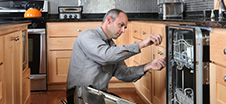 Large domestic appliances are commonly known as white goods. This term includes fridges, freezers, washing machines, tumble dryers, dishwashers and cookers. An indispensable part of modern life, they are produced to rigorous safety standards and designed to last. They often represent a significant investment and should be registered with the manufacturer to ensure that qualified maintenance affords them the longest and safest possible lifespan.
Large domestic appliances are commonly known as white goods. This term includes fridges, freezers, washing machines, tumble dryers, dishwashers and cookers. An indispensable part of modern life, they are produced to rigorous safety standards and designed to last. They often represent a significant investment and should be registered with the manufacturer to ensure that qualified maintenance affords them the longest and safest possible lifespan.
Floor cleaners and other small appliances may cost comparatively less yet they are produced to equally strict standards of both safety and performance. They too are well worth registering.
The history of safety standards
The first major appliances were introduced into the UK in the early 1900s and were a luxury afforded by a privileged few. As domestic ownership has widened, this has been accompanied by a continuous process of development of both safety and performance standards. The first appliance testing laboratories were set up following World War One.
The British Standards Institution (BSI) was one of the founder members of a committee set-up in 1926, to unify safety specifications. This later became the International Electro-technical Commission (IEC), which agrees worldwide standards. As well as following all IEC standards, the BSI also follows Standards specifically set for features unique to the appliances used in the European market
Since the International Organisation for Standardisation (ISO) was established in the 1940s, it has further facilitated the international coordination of industrial standards and it now harmonises standards across 163 countries.










 Large domestic appliances are commonly known as white goods. This term includes fridges, freezers, washing machines, tumble dryers, dishwashers and cookers. An indispensable part of modern life, they are produced to rigorous safety standards and designed to last. They often represent a significant investment and should be registered with the manufacturer to ensure that qualified maintenance affords them the longest and safest possible lifespan.
Large domestic appliances are commonly known as white goods. This term includes fridges, freezers, washing machines, tumble dryers, dishwashers and cookers. An indispensable part of modern life, they are produced to rigorous safety standards and designed to last. They often represent a significant investment and should be registered with the manufacturer to ensure that qualified maintenance affords them the longest and safest possible lifespan.